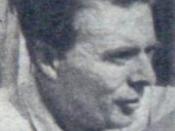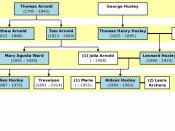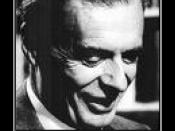Despite different contexts both Aldous Huxley within his book "Brave New World" and Ridley Scott in the film "Blade Runner" explore the idea that humans feel themselves more sophisticated than the natural world, yet are able to completely sever relations between humanity and the nature. Through various techniques both texts warn their varied audiences of the negative ramifications that will come from such disdainful, careless opinions and actions.
All aspects of the 'New State' within Aldous Huxley's novel Brave New World indicate a belief that humanity is more sophisticated than the wild. Huxley's continuous use of fake scientific jargon, while setting up his science fiction genre, also allows his characters and their actions to appear intelligent. Words such as "bokanovskified" serve the purpose of describing how science has replaced the natural process of reproduction. This implies that there is a general feeling in the 'New State' that the people, particularly those at the head of the social hierarchy, feel that humans, aided by science, are more sophisticated than the wild.
While this may be so Huxley makes it clear that the members of this new world are unable to escape nature's rhythms. At various points through out the book different characters make reference to needing a "pregnancy surrogacy". This indicates to the audience that, although natural reproduction has been replaced by science, the instincts of a woman to bear children could not be eradicated. At the same time Huxley uses irony. While his characters feel natural urges they are able to over come them through such "pregnancy surrogacy", demonstrating that the persons of the New State still feel that science and humanity are more sophisticated than the natural rhythms of human beings.
Huxley again uses irony in emotive language such as "corpse coloured rubber" to describe the hatchery. While providing...



Excellent
This essay is great! Well supported in both texts. Add a little bit of contextual influences etc and I would have no complaints.
0 out of 0 people found this comment useful.